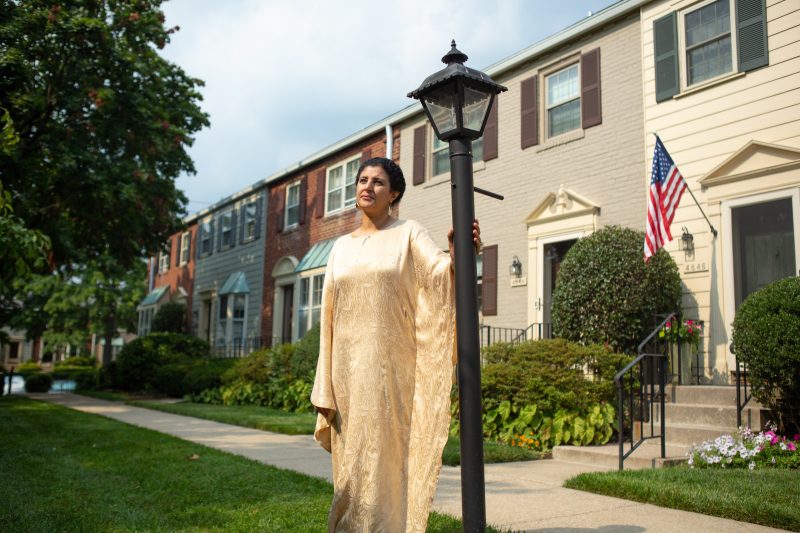Jamal Khashoggi’s widow, who went into hiding after The Washington Post columnist was murdered in 2018 by a Saudi assassination squad, has been granted political asylum in the United States.
“I couldn’t really believe it,” Hanan Elatr said after reading the letter informing her of the decision. “I said, ‘Is this real?’ I couldn’t digest it.” She said the decision “shows there is one victim who is still alive.”
The decision this month validates Elatr’s assertions that her life would be in danger were she to return to her native Egypt or the United Arab Emirates, where she lived for 26 years until Jamal Khashoggi was killed.
It also may be one of the final acts in the long-running Khashoggi case, which at one time seemed to threaten U.S.-Saudi relations. Those tensions were dismissed during the Trump administration and papered over with the Biden administration’s decision last year to reconcile with Saudi Arabia and grant sovereign immunity to Saudi Crown Prince Mohammed bin Salman, who the CIA concluded ordered Khashoggi’s killing.
“Hanan Khashoggi has the clearest case for political asylum imaginable, and I am happy that I could help her get this vital protection,” Rep. Don Beyer (D-Va.) said in a statement. “After all that she and her family have been through, it is good to see them granted this recognition and the measure of security that will come with it. I will continue to support Mrs. Khashoggi as she seeks accountability for her husband’s murder, a terrible injustice which I will not forget.”
In her asylum application, Elatr told U.S. authorities that Egypt had detained and mistreated her family and confiscated their passports because of her relationship with Khashoggi. In 2018, four months before his murder, the UAE had detained and interrogated her and put military-grade spyware on her confiscated phones. It was a period of time when she and Khashoggi were in constant communication.
Randa Fahmy, her attorney, said Elatr is seeking compensation from the Saudi government for her husband’s death and demanding Turkey return Khashoggi’s phones so that they can be analyzed.
The UAE, a longtime Saudi ally, has denied allegations that it planted Pegasus spyware on Elatr’s devices or spied on civil society activists and disgruntled royal family members, as previous Post reporting has shown.
Khashoggi, who had once worked at the Saudi Embassy in Washington, had become an effective critic of Mohammed’s crackdown and imprisonment of citizens advocating for more freedom of expression and democratic reform. By 2018, he had been warned not to return and had settled in Northern Virginia, where he had been previously married, raised children and had an apartment.
In March 2018, the couple, who’d met in 2009, became romantically involved. In June, they were married in an Islamic ceremony in Northern Virginia. They continued to live apart — he in Fairfax; she in Dubai, where she worked as an airline attendant for Emirates airlines.
But Khashoggi felt increasingly depressed and isolated, and they decided to move to Turkey, where many Saudis live. Elatr said Khashoggi believed his voice might have more impact there. She was unaware that he had begun a relationship in Turkey with another woman.
In October 2018, as Khashoggi was arranging to marry a young Turkish academic, Hatice Cengiz, Khashoggi went to the Saudi consulate in Istanbul to pick up a document her father had requested certifying that he was not married in Saudi Arabia. Knowing he was coming, a team of assassins from Saudi Arabia flew in beforehand. They strangled him, dismembered his body with a bone saw and sneaked his body parts out in luggage, investigators determined.
In July 2020, Elatr lost her longtime job as a flight attendant when Emirates declined to renew her contract. Without it, she could no longer live in Dubai. She flew to Washington shortly afterward and, fearing for her safety, went into hiding in her lawyer’s apartment for a year and a half.
She spent most of her savings and for a time was sleeping on an air mattress in an empty apartment. At age 53, she moved into a basement bedroom of a stranger while waiting for her political asylum case to work its way through the system.
As a presidential candidate, Joe Biden called Saudi Arabia “a pariah” state; as president, however, he famously fist-bumped with Mohammed in 2022, reconciled with him and granted him sovereign immunity, which quickly ended a U.S. civil lawsuit Cegniz had brought against him for the murder.








